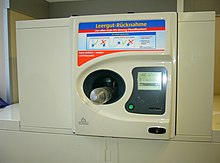Deposit system
A deposit system is a system of returning consumer goods (the pledged goods) to the seller or a separate collection point for the purpose of recycling either the goods themselves or at least their material substance , which creates an incentive for the consumer to return the goods is that the consumer gives a value (the deposit or especially Austrian stake) upon receipt of the goods , which he receives back with the return of the goods.
Systemic approach to return to the seller
There are different levels of abstraction from the actual output ratio retailers / consumers that the marketability of increase of the lien, so that the repatriation easier and so the acceptance and efficiency increase of the deposit system.
The simplest and not abstracted form is that for a certain pledge a certain valuable object is given, which is assigned to it. Here, the valuable item can only be recovered by surrendering the pledged item assigned to it, which often requires the additional surrender of owner cards and is therefore relatively cumbersome. In addition, with the destruction or deterioration of the object given, a considerable disruption of the individual pledge relationship and the entire system would occur.
By using money as a pledge, which is only to be returned as a sum and not in the form of the specific monetary tokens once given, the occurrence of such problems can be largely prevented - it is the first level of abstraction, namely abstraction from the specific object of value given . But even with this abstraction there would still be problems, because the seller would only be in the pledge relationship with the consumer with regard to the specific pledged goods that were once given. This is overcome by the fact that the seller also has to surrender the pledge for goods of the same type and quality as the pledged good - second level of abstraction, abstraction from the specific pledged good .
In the third stage, one can abstract from the amount of returnable goods that were once given to the consumer , so that returnable goods can also be redeemed from a seller from whom they were not bought at all, provided that their type and quality are those that he sells and also takes back, i.e. corresponds to the same class as the pledged goods sold by him. This considerably simplifies the redeemability of the returnable goods and increases the efficiency of the system considerably. By using largely uniform goods as deposit goods within the scope of the deposit system, this simplification and thus efficiency can be further increased.
In the fourth stage, the genus of the pledged item itself can also be abstracted by making anyone who sells even one type of pledged item liable not only to include all goods of this type, i.e. goods of the same type and quality, but also goods of other types To accept surrender of the pledge raised for them. However, this level benefits the consumer at the expense of the seller, who will thoroughly consider whether he is still working with deposit goods and thus the overall efficiency of the system is in question.
The third level of abstraction has proven to be particularly practical; it is common in Germany today for classic returnable bottles .
The different types of deposit
There are essentially two types of packaging deposit in Germany, divided into several groups:
- The one-way deposit for disposable packaging , which, in particular PET bottles and aluminum - beverage cans comprises. However, there are also non-returnable glass bottles , all of which are subject to a deposit of € 0.25. There are also occasional aluminum bottles.
- The returnable deposit , which mainly concerns glass bottles ( beer : € 0.08, swing-top bottles : € 0.15, well bottles / standard well bottles : € 0.15) and reusable plastic bottles (€ 0.15). However, there are exceptions, such as B. the 200 ml Schweppes bottle (€ 0.10), the Andechser , Landliebe and Söbbeke yoghurt glass (€ 0.15) and the reusable deposit keg , which is usually subject to a deposit of € 50 in wholesalers .
There is also a deposit for car batteries according to the Battery Ordinance:
- Deposit of € 7.50 per car battery including sales tax
System approach separate collection point - collection chain
Instead of, or in addition to, the taking back by the seller, the taking back can also be done by separate collection points. The problem is that the collection point never received a deposit because they did not distribute the deposit. In this respect, the positions must therefore lead. However, this problem also arises where the seller also has to take back goods from his type of deposit that he did not sell, for which he has not received a deposit either. So that the deposit system does not fail at this point, sellers and other collection points must for their part be able to pass on the returned goods. This return chain is then to extend to the manufacturer or the economic user (bottler for returnable bottles) of the goods, who in turn is the first to collect the deposit. This is the only way to prevent, on the one hand, that new raw materials are used, where re-use is reasonable and possible, and, on the other hand, that a link in the chain loses its deposit through no fault of its own.
The pledge
In principle, any commodity that is suitable for re-using itself or its substance can be a deposit. Nowadays, packaging in particular is passed on as deposit goods in order to at least partially satisfy the demand for packaging generated by the flood of packaging by means of reused material.
See also
- Packaging Ordinance (no longer in force)
- Packaging Act
